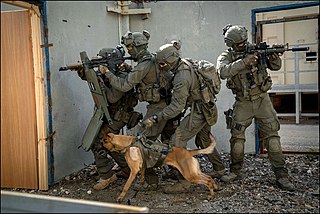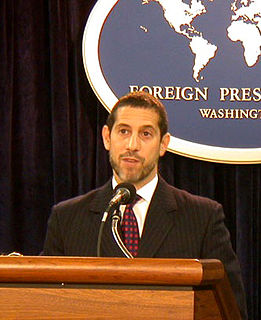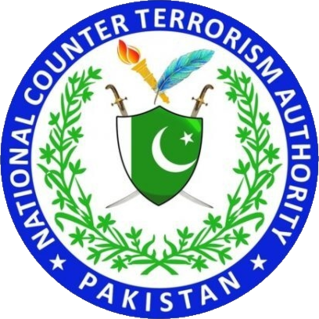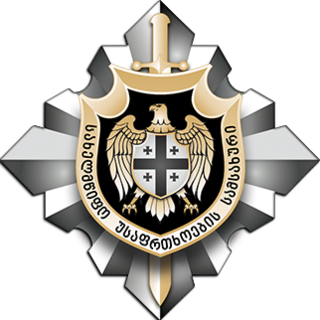
Counter-terrorism incorporates the practice, military tactics, techniques, and strategy that government, military, law enforcement, business, and intelligence agencies use to combat or prevent terrorism. Counter-terrorism strategies include attempts to counter financing of terrorism.

The Counterterrorism Division (CTD) is a division of the National Security Branch of the Federal Bureau of Investigation. CTD terrorist threats inside the United States, provides information on terrorists outside the country, and tracks known terrorists worldwide. In the wake of the September 11, 2001 attacks, CTD's funding and manpower have significantly increased.

The Bureau of Counterterrorism and Countering Violent Extremism (CT) is a bureau of the United States Department of State. It coordinates all U.S. Government efforts to improve counter-terrorism cooperation with foreign governments and participates in the development, coordination, and implementation of American counterterrorism policy.
The Joint Terrorism Analysis Centre (JTAC) is an all-source intelligence organisation closely related to the United Kingdom Security Service which provides advice to the British government and firms within the Critical National Infrastructure on terrorist threats.

Politiets Efterretningstjeneste (PET) is the national security and intelligence agency of Denmark. The agency focuses solely on national security, and foreign intelligence operations are handled by Forsvarets Efterretningstjeneste, the foreign intelligence service administered by the Danish Royal Defense.
The Australian Intelligence Community (AIC) and the National Intelligence Community (NIC) or National Security Community of the Australian Government are the collectives of statutory intelligence agencies, policy departments, and other government agencies concerned with protecting and advancing the national security and national interests of the Commonwealth of Australia. The intelligence and security agencies of the Australian Government have evolved since the Second World War and the Cold War and saw transformation and expansion during the Global War on Terrorism in response to current international and domestic security issues such as terrorism, violent extremism, cybersecurity, transnational crime, counter-proliferation, support to military operations, and Pacific regional instability.
The Department of the Prime Minister and Cabinet (PM&C) is an Australian Government public service central department of state with broad ranging responsibilities, primary of which is for intergovernmental and whole of government policy coordination and assisting the Prime Minister of Australia in managing the Cabinet of Australia. The PM&C was established in 1971 and traces its origins back to the Prime Minister's Department established in 1911.
The counter-terrorism page primarily deals with special police or military organizations that carry out arrest or direct combat with terrorists. This page deals with the other aspects of counter-terrorism:

Bruce Hoffman is a political analyst specializing in the study of terrorism and counterterrorism and insurgency and counter-insurgency. He is a tenured professor at Georgetown University's Edmund A. Walsh School of Foreign Service, where between 2010 and 2017 he was the director of the Center for Security Studies and director of the security studies program. Hoffman is the second longest-serving director in the center and program's three-decade history. He is also visiting Professor of Terrorism Studies at St Andrews University, Scotland.

The Deployable Operations Group (DOG) was a United States Coast Guard command that provided properly equipped, trained and organized Deployable Specialized Forces (DSF) to Coast Guard, DHS, DoD and inter-agency operational and tactical commanders. Formerly headquartered in Arlington, Virginia, it was established on 20 July 2007, and was commanded by a captain and was decommissioned by the Commandant of the Coast Guard, Admiral Robert Papp on 1 October 2013. Although many of the units existed long before the 2007 commissioning. Upon decommissioning, the units previously assigned to the DOG were split between Coast Guard Pacific and Atlantic Area commands.

Institute for National Security and Counterterrorism (INSCT) is a research institute sponsored by the Maxwell School of Citizenship and Public Affairs and Syracuse University College of Law. INSCT was established in 2003 by Prof. William C. Banks with the goal of support an interdisciplinary approach to questions of national security and counter-terrorism law and policy.
Jeffrey H. Norwitz is an American expert in counter-terrorism and law enforcement.
Norwitz spent 38 years as a law enforcement officer, the last 25 years of which were spent with the Naval Criminal Investigative Service.
From 2006 through 2009 he held the John Nicholas Brown Chair of Counterterrorism at the Naval War College.
Norwitz is known for his publications on counter-terrorism, and for frequently being consulted as a "terrorism expert".
Norwitz is also the author of several books on counter-terrorism.

The National Intelligence and Security Agency (NISA) Somali: Hay'ada Sirdoonka iyo Nabadsugida Qaranka (HSNQ) is the national intelligence agency of the Federal Republic of Somalia is in-charge of secret service, intelligence and covert operations for the national interests of Somalia, The main objective of (NISA) is to collect the intelligence data through different means and to safeguard the national interests. The job is to identify and block the threats to the state and its citizens and to reinforce the country's security and safety according to the constitution.
The International Centre for Counter-Terrorism (ICCT) is an independent think and do tank providing multidisciplinary policy advice and practical, solution-oriented implementation support on prevention and the rule of law, two vital pillars of effective counter-terrorism. ICCT’s work focuses on themes at the intersection of countering violent extremism and criminal justice sector responses, as well as human rights related aspects of counter-terrorism. The major project areas concern countering violent extremism, rule of law, foreign fighters, country and regional analysis, rehabilitation, civil society engagement and victims’ voices.

The National Counter Terrorism Authority is an Internal Counterterrorism Authority of Pakistan. NACTA is mandated to devise a counter-terrorism strategy that should address short, medium and long-term goals and devise action plans for their implementation.

The State Security Service of Georgia (SSSG) is a secretive militarized government agency of the Republic of Georgia, which covers a broad spectrum of tasks to preserve national security in accordance to state legislature and relevant laws. Its missions are to protect the constitutional order, sovereignty, territorial integrity and military potential of Georgia from illegal acts of special services and individuals of foreign countries; to prevent violent and unconstitutional change of order and state authority. Further it is to ensure economic security and fight terrorism on national and international level, transnational organized crime and international crime as well as carry out measures towards prevention, detection and suppression of corruption. It is also responsible for protecting state secrets. The newly established independent agency is a former subordinate branch of the Ministry of Internal Affairs of Georgia and has been re-activated in 2015.

The National Counter Terrorism Policing Network (NCTPN) is the national collaboration of police forces in the United Kingdom working to prevent, deter and investigate terrorism in the United Kingdom. The Network is governed by the National Police Collaboration Agreement Relating to Counter Terrorism Activities Made Under Section 22A of the Police Act 1996. The Network is accountable to the United Kingdom Government and the National Police Chiefs' Council Counter Terrorism Coordination Committee which is chaired by the Metropolitan Police Service Assistant Commissioner of Specialist Operations (ACSO) who also acts as the National Lead for Counter Terrorism Policing. The Network is also functionally coordinated by the Senior National Coordinator for Counter Terrorism who is usually a Metropolitan Police Service Deputy Assistant Commissioner co-located within the Counter Terrorism Command.
The Department of Home Affairs is the Australian Government interior ministry with responsibilities for national security, law enforcement, emergency management, border control, immigration, refugees, citizenship, and multicultural affairs. The portfolio also includes federal agencies such as the Australian Federal Police, Australian Border Force and the Australian Security Intelligence Organisation. The Home Affairs portfolio reports to the Minister for Home Affairs The Hon. Peter Dutton MP and is led by Secretary of the Department of Home Affairs Mike Pezzullo.











